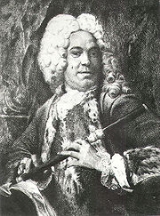
Michel de la Barre
Encyclopedia

France
The French Republic , The French Republic , The French Republic , (commonly known as France , is a unitary semi-presidential republic in Western Europe with several overseas territories and islands located on other continents and in the Indian, Pacific, and Atlantic oceans. Metropolitan France...
composer
Composer
A composer is a person who creates music, either by musical notation or oral tradition, for interpretation and performance, or through direct manipulation of sonic material through electronic media...
and renowned flautist
Flautist
A flautist or flutist is a musician who plays an instrument in the flute family. See List of flautists.The choice of "flautist" versus "flutist" is the source of dispute among players of the instrument...
known as being the first person to publish solo flute
Flute
The flute is a musical instrument of the woodwind family. Unlike woodwind instruments with reeds, a flute is an aerophone or reedless wind instrument that produces its sound from the flow of air across an opening...
music. He played in the Académie Royale de Musique, the Musettes and Hautbois de Poitou and the courts of Louis XIV and Louis XV.
Works
- 1694 : Premier Livre des Trio, pour les violons, Flûtes et hautbois, par Monsieur De La Barre, Flûte de la Chambre du Roy, Paris, Christophe Ballard, 1694 ; Seconde Edition, revûë & corrigée [...], Paris, Christophe Ballard.
- 1700 : Le Triomphe des Arts, opéra-ballet en cinq actes sans prologue, sur un livret d’Houdar de La MotteAntoine Houdar de la MotteAntoine Houdar de la Motte was a French author.He was born and died in Paris. In 1693 his comedy, Les Originaux, was a complete failure, and so depressed the author that he contemplated joining the Trappists. Four years later he began writing texts for operas and ballets, e.g...
, représenté pour la première fois par l'Académie Royale de Musique, le . - 1700 : Pièces en trio pour les violons, flustes et hautbois, composées Par le sieur De La Barre, Livre Second, […], Paris, Christophe Ballard.
- 1702 : Pièces pour la Flûte Traversière avec la Basse-Continue, […] Œuvre Quatrième, […], Paris, Christophe Ballard.
- 1705 : La Vénitienne, Comédie-lyrique en un prologuePrologueA prologue is an opening to a story that establishes the setting and gives background details, often some earlier story that ties into the main one, and other miscellaneous information. The Greek prologos included the modern meaning of prologue, but was of wider significance...
et trois actes sur un livret d’Houdar de La MotteAntoine Houdar de la MotteAntoine Houdar de la Motte was a French author.He was born and died in Paris. In 1693 his comedy, Les Originaux, was a complete failure, and so depressed the author that he contemplated joining the Trappists. Four years later he began writing texts for operas and ballets, e.g...
, créé à l’Académie le 26 mai 1705. - 1707 : Troisième Livre des Trio pour les violons, flûtes, et hautbois, mélez de Sonates pour la Flûte traversière, […], Paris, Christophe Ballard.
- 1709 : Air dans Airs sérieux et à boire de différents auteurs […], Christophe Ballard, mars 1709 [p. 57 ; PBN Vm7 542] : « Vous me parlez toujours d’Iris »
- 1709 : Première Suitte de Pièces à deux flûtes traversières, […], Paris, Foucaut.
- 1710 : Deuxième Suite de Pièces à deux flûtes traversières, […], Paris, Foucaut.
- 1710 : Deuxième Livre de Pièces pour la flûte traversière, Avec la Basse Continuë, […], Paris, Foucaut.
- 1711 : Troisième Suite à deux flûtes traversières sans basse, […], Paris, Foucault.
- 1711 : Quatrième [& 5e] Suite [s] à deux flûtes traversières sans basse, […], Paris, Foucault.
- 1713 : Cinquième Livre contenant la Sixième, et la septième suite à deux flûtes traversières sans basse, […], Paris, Foucault.
- 1714 : Sixième Livre contenant la huitième et la neuvième Suite à deux Flûtes Traversières sans basse, […], Paris, Foucault.
- 1721 : Septième Livre contenant la Xe et la XIe Suitte de Pièces à 2 Flûtes-Traversieres fans Baße. […], Paris, Boivin.
- 1722 : Neufième Livre contenant deux Sonates à deux flûtes traversières sans Basse. […], Paris, Boivin.
- 1722 : Dixième Livre contenant 2 Suittes à deux Flûtes-Traversières sans Basse. […], Paris, Boivin.
- 1722 : Huitième Livre, contenant Deux Suites pour la flûte traversière avec la basse, […], Paris, Boivin.
- 1724 : Recueil d’airs à boire à deux parties…
- 1725 : Douzième Livre contenant Deux Suites à deux Flûtes Traversières fans Basse. […], Paris, Boivin.
Further reading
- Benoît, Marcelle. 1971. Musiques de cour: chapelle, chambre, écurie, 1661-1733. Paris: Picard.
- Bowers, Jane M. 2001. "La Barre, Michel de". The New Grove Dictionary of Music and Musicians, second edition, edited by Stanley SadieStanley SadieStanley Sadie CBE was a leading British musicologist, music critic, and editor. He was editor of the sixth edition of the Grove Dictionary of Music and Musicians , which was published as the first edition of the New Grove Dictionary of Music and Musicians.Sadie was educated at St Paul's School,...
and John TyrrellJohn Tyrrell (professor of music)John Tyrrell was born in Salisbury, Southern Rhodesia in 1942. He studied at the universities of Cape Town, Oxford and Brno. In 2000 he was appointed Research Professor at Cardiff University....
. London: Macmillan Publishers. - Huskinson, John. 1977. "'Les Ordinaires de la Musique du Roi': Michel de La Barre, Marin Marais et les Hotteterre, d'après un tableau du début du XVIIIe siècle". Recherches sur la musique française classique 17:15–30.
- Sillanolli, Marie-Hélène. 1984. La vie et l’œuvre de Michel de La Barre, flûtiste de la chambre et compositeur du roi. Paris: thèse de 3e cycle de Sorbonne.

